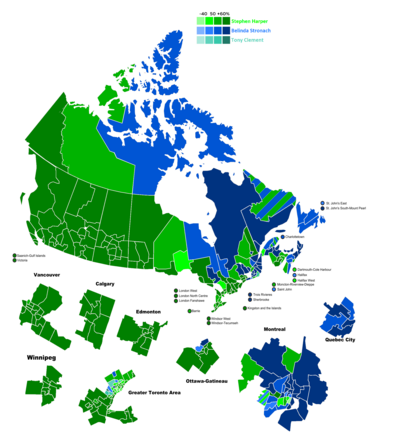| |||||||||||||||||||||||||
| |||||||||||||||||||||||||
 Results by Canadian electoral district | |||||||||||||||||||||||||
| |||||||||||||||||||||||||
| Convention | Metro Toronto Convention Centre, Toronto |
|---|---|
| Won by | Stephen Harper |
| Ballots | 1 |
| Candidates | 3 |
| Entrance Fee | C$100,000[1] |
| Spending limit | C$2.5 million[2] |
The 2004 Conservative Party of Canada leadership election took place on March 20, 2004, in Toronto, Ontario, and resulted in the election of Stephen Harper as the first leader of the new Conservative Party of Canada. The Conservative Party was formed by the merger of the Canadian Alliance and the Progressive Conservative Party of Canada, in December 2003.
Stephen Harper, the former leader of the Canadian Alliance, was elected on the first (and only) ballot. Tony Clement, a former Ontario Progressive Conservative health minister, and Belinda Stronach, the former chief executive officer of Magna International, were the other candidates on the ballot.[3]
The leader was selected by a system in which each of the party's riding associations was allocated 100 points, which were allocated among candidates in proportion to the votes that he or she received. This system was selected as a condition of the merger, to prevent the far larger Canadian Alliance membership base from overwhelming that of the Progressive Conservatives.
Members voted using ranked ballots. If no candidate won a majority of votes in the first round, the ballots supporting the candidate with the smallest number of votes would be re-distributed according to the voters' second preferences. Subsequent rounds were not needed, however, because Stephen Harper won in the first round.
- ^ Rachel Décoste (October 12, 2008). "How Much Does it Cost to be a Liberal These Days?". Huffingtonpost.ca. Retrieved September 18, 2017.
- ^ "Conservative leadership race kicks off with $50,000 entrance fee and $5M spending cap". National Post. March 8, 2016. Retrieved March 12, 2016.
- ^ "Harper wins Conservative leadership". CBC News, March 22, 2004.



